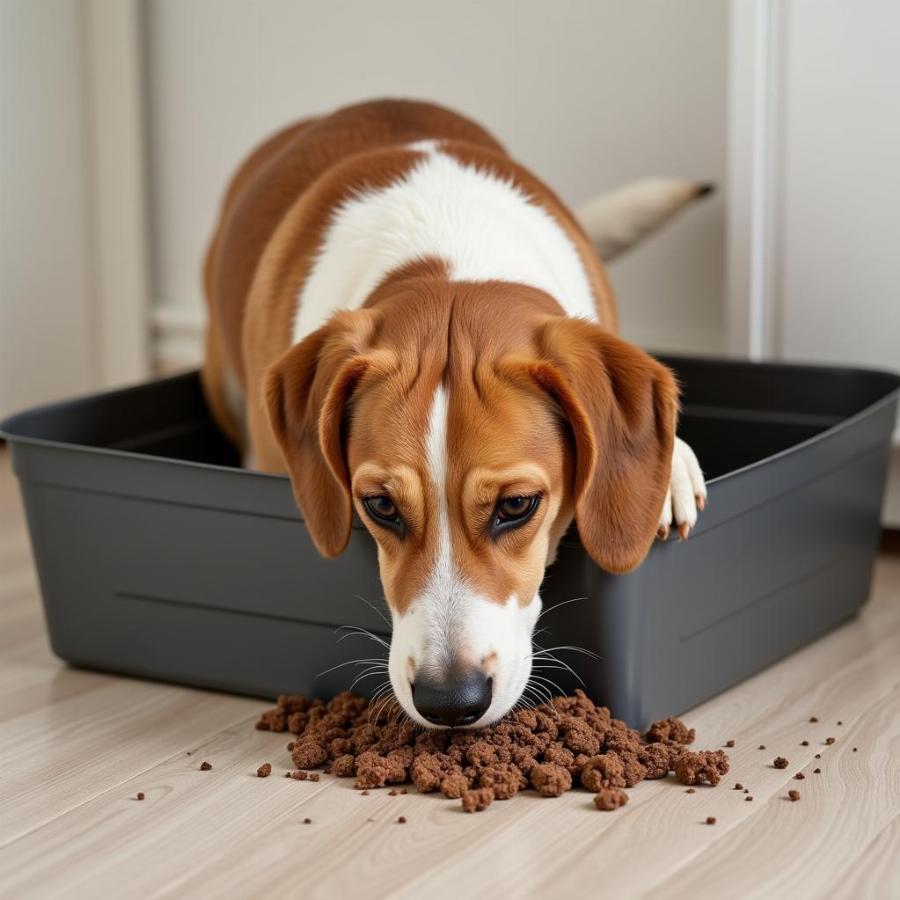It’s a question that makes most dog owners cringe: why does my dog eat cat feces? While incredibly unpleasant, the behavior, known as coprophagia, is surprisingly common in dogs. While not always a cause for concern, understanding the potential reasons behind this unsavory habit can help you address it.
Possible Causes of Coprophagia in Dogs
There are several reasons why your dog might be engaging in this behavior, ranging from medical to purely behavioral:
1. Dietary Deficiencies
Sometimes, dogs eat feces, particularly cat feces, if they are missing essential nutrients in their diet. Cat feces, being high in protein and fat, can be appealing to a dog with dietary imbalances.
Expert Insight: “Dogs on low-quality food or with underlying health conditions affecting nutrient absorption might be more prone to coprophagia,” says Dr. Emily Parker, a veterinarian specializing in canine nutrition. “Switching to a balanced, high-quality diet can sometimes curb this behavior.”
2. Boredom or Anxiety
Just like humans engage in nervous habits, dogs might eat feces out of boredom or anxiety. A lack of mental and physical stimulation can lead to unusual behaviors.
 Dog Exhibiting Anxiety While Eating Cat Feces
Dog Exhibiting Anxiety While Eating Cat Feces
3. Parasites
Internal parasites, like worms, can interfere with a dog’s nutrient absorption, leading them to seek out other sources, including feces.
Expert Insight: “If you suspect parasites, a visit to your veterinarian for a fecal examination and appropriate deworming medication is crucial,” advises Dr. Parker.
4. Learned Behavior
Puppies often explore the world through their mouths, and this can include tasting feces. If the behavior isn’t corrected early on, it can become an ingrained habit.
5. Medical Conditions
In rare cases, medical conditions like diabetes, pancreatic insufficiency, or intestinal diseases can trigger coprophagia.
Addressing Coprophagia: Tips for Dog Owners
- Consult Your Veterinarian: This should be your first step to rule out any underlying medical conditions.
- Switch to a High-Quality Diet: Ensure your dog’s food provides all the necessary nutrients.
- Provide Ample Enrichment: Offer plenty of exercise, mental stimulation with puzzle toys, and interactive playtime.
- Clean Up Immediately: Make the cat litter box inaccessible or scoop it frequently to remove the temptation.
- Positive Reinforcement: Use positive reinforcement techniques like rewarding your dog when they ignore the cat feces.
- Consider a Taste Deterrent: Sprinkle a commercially available taste deterrent on the cat feces to make it less appealing.
When to Seek Professional Help
If the behavior persists despite your efforts, consult a certified dog trainer or a veterinary behaviorist. They can help identify the root cause and recommend specific behavior modification techniques.
Conclusion
While the sight of your dog eating cat feces might be repulsive, understanding the potential causes can help you address the issue effectively. By ruling out medical factors, providing a stimulating environment, and employing consistent training methods, you can help your furry friend break this undesirable habit.
FAQs
1. Is it harmful for my dog to eat cat feces?
While generally not life-threatening, it can expose your dog to parasites or harmful bacteria.
2. Will my dog get sick from eating cat feces?
It’s possible. Cat feces can carry parasites and bacteria that can cause vomiting, diarrhea, or other health issues in dogs.
3. Can I use home remedies to stop my dog from eating cat feces?
While some home remedies exist, it’s best to consult your veterinarian for safe and effective solutions.
4. Will spaying or neutering my dog stop this behavior?
Spaying or neutering might reduce hormone-driven coprophagia but is unlikely to eliminate the behavior entirely.
5. I’ve tried everything, but my dog still eats cat feces. What should I do?
Consult a certified dog trainer or veterinary behaviorist for professional help. They can offer tailored solutions based on your dog’s specific needs.
Need more help understanding your dog’s behavior? Check out these related articles:
- mad dog transmission
- why does a dog eat dirt
- mucousy stools in dogs
- broad spectrum dewormer for dogs
- why would my dog poop blood
Beaut Dogs is your go-to resource for all things dog-related. We provide trustworthy and insightful information to help you understand and care for your canine companion. For personalized advice and support, contact our experts at [email protected]. Let Beaut Dogs guide you on your journey to responsible dog ownership.